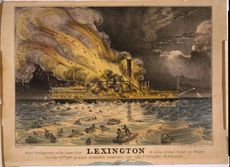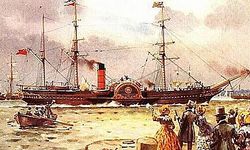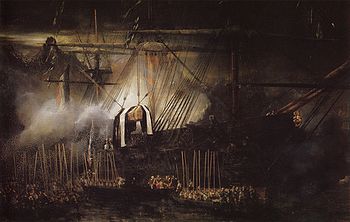1840
| Millennium: | 2nd millennium |
|---|---|
| Centuries: | 18th century – 19th century – 20th century |
| Decades: | 1810s 1820s 1830s – 1840s – 1850s 1860s 1870s |
| Years: | 1837 1838 1839 – 1840 – 1841 1842 1843 |
| 1840 in topic: |
| Subjects: Archaeology – Architecture – |
| Art – Literature (Poetry) – Music – Science |
| Sports – Rail Transport |
| Countries: Australia – Canada – China – France – Germany – Ireland – Mexico – Netherlands – New Zealand – Norway – South Africa – Spain – UK – USA |
| Leaders: State leaders – Colonial governors |
| Category: Establishments – Disestablishments |
| Births – Deaths – Works |
Year 1840 (MDCCCXL) was a leap year starting on Wednesday (link will display the full calendar) of the Gregorian calendar (or a leap year starting on Monday of the 12-day slower Julian calendar).
Contents |
Events
January–April

January 13: Steamship Lexington sinks.
- January 3 – One of the predecessor papers of the Herald Sun of Melbourne, Australia, The Port Phillip Herald, is founded.
- January 10 – Uniform penny postage is introduced in the UK.
- January 13 – The steamship Lexington burns and sinks in icy waters, 4 miles off the coast of Long Island; 139 die, only 4 survive.
- January 19 – Captain Charles Wilkes circumnavigates Antarctica, claiming what becomes known as Wilkes Land for the United States.
- January 20
- Dumont D'Urville discovers Adélie Land, Antarctica.
- The first public school is established in Rockingham County.
- January 22 – British colonists reach New Zealand, officially founding Wellington.
- February – The Rhodes blood libel is made against the Jews of Rhodes.
- February 5 – The murder of a Capuchin friar and his Greek servant leads to the Damascus affair, a highly publicized case of blood libel against the Jews of Damascus.
- February 6 – The Treaty of Waitangi, granting British sovereignty in New Zealand, is signed.
- February 10 – Queen Victoria of the United Kingdom marries Prince Albert of Saxe Coburg-Gotha.
- February 11 – Gaetano Donizetti's opera La Fille du Regiment premieres in Paris.
- March 1
- William Hobson, the first Governor of New Zealand, suffers a stroke.
- Adolphe Thiers becomes prime minister of France.
- March 9 – The Wilmington and Raleigh Railroad is completed from Wilmington, North Carolina to Weldon, North Carolina. At 161.5 miles, it is the world's longest railroad.[1]
- April – The Raleigh and Gaston Railroad is completed from Raleigh, North Carolina to near Weldon, North Carolina.[2]
- April 15 – King's College Hospital opens in Portugal Street, London.
May–August
- May 1 – Britain issues the Penny Black, the world's first postage stamp.
- May 6 – The Penny Black, the world's first postage stamp, becomes valid for the pre-payment of postage.
- May 7 – The Great Natchez Tornado: A massive tornado strikes Natchez, Mississippi during the early afternoon hours. Before it is over, 317 people are killed and 109 injured. It is the second deadliest tornado in U.S. history.
- May 21 – New Zealand is declared a British colony.

July 4: RMS Britannia.
- July 4 – The Cunard Line's 700-ton wooden paddlewheel steamer RMS Britannia departs from Liverpool, bound for Halifax, Nova Scotia on the first transatlantic passenger cruise.
- July 15 – The Austrian Empire, the United Kingdom of Great Britain and Ireland, the Kingdom of Prussia, and the Russian Empire sign the London Treaty with the Sublime Porte, ruler of the Ottoman Empire.
- July 23 – Pedro II is declared "of age" prematurely and begins to reassert central control in Brazil.
- July 23 – The Province of Canada is created by the Act of Union.
- August 10 – Fortsas hoax: A number of book collectors gather in Binche, Belgium to attend a non-existent book auction of the late "Count of Fortsas".
September–December
- September 10 – Ottoman and British troops bombard Beirut and land troops on the coast to pressure Egyptian Muhammad Ali to retreat from the country.
- September 16 – Joseph Strutt hands over the deeds and papers concerning the Arboretum, which later becomes England's first public park.
- September 30 – The frigate Belle-Poule arrives in Cherbourg, bringing back the remains of Napoléon from Saint Helena to France. He is buried in the Invalides.
- October 7 – Willem II becomes King of the Netherlands.
- November 4 – U.S. presidential election, 1840: William Henry Harrison defeats Martin Van Buren.
- December 7 – David Livingstone leaves Britain for Africa.
- December 7 – The Stockport Viaduct (located in Greater Manchester, England) is completed. It is the largest brick structure in Western Europe.
- December 15 – The corpse of Napoleon is placed in the Hotel des Invalides in Paris.
Undated

The frigate Belle-Poule brings back the remains of Napoléon to France.
- Louis Agassiz publishes 2-volume work entitled Etudes sur les glaciers ("Study on Glaciers"), the first major work to scientifically propose that the Earth has been subject to a past ice age.
- Mount Allison University is founded in Sackville, New Brunswick, Canada.
- The Washingtonian Temperance Society is founded.
- The first English translation of Goethe's Theory of Colours by Charles Eastlake is published.
- US Census Bureau reports 6,000 free Negroes holding slaves in the nation.
- William Turner first displays his painting The Slave Ship
Ongoing events
Births
| Gregorian calendar | 1840 MDCCCXL |
| Ab urbe condita | 2593 |
| Armenian calendar | 1289 ԹՎ ՌՄՁԹ |
| Bahá'í calendar | -4 – -3 |
| Bengali calendar | 1247 |
| Berber calendar | 2790 |
| Buddhist calendar | 2384 |
| Burmese calendar | 1202 |
| Byzantine calendar | 7348 – 7349 |
| Chinese calendar | 己亥年十一月廿七日 (4476/4536-11-27) — to —
庚子年十二月初八日(4477/4537-12-8) |
| Coptic calendar | 1556 – 1557 |
| Ethiopian calendar | 1832 – 1833 |
| Hebrew calendar | 5600 – 5601 |
| Hindu calendars | |
| - Bikram Samwat | 1896 – 1897 |
| - Shaka Samvat | 1762 – 1763 |
| - Kali Yuga | 4941 – 4942 |
| Holocene calendar | 11840 |
| Iranian calendar | 1218 – 1219 |
| Islamic calendar | 1255 – 1256 |
| Japanese calendar | Tenpō 11 (天保11年) |
| Korean calendar | 4173 |
| Thai solar calendar | 2383 |
- January 3 – Father Damien, Belgian missionary priest (d. 1889)
- January 22 – Ernest Roland Wilberforce, English bishop (d. 1907)
- January 23 – Ernst Abbe, German physicist (d. 1905)
- January 26 – John Clayton Adams, British landscape artist (d. 1906)
- February 4 – Hiram Stevens Maxim, American firearms inventor (d. 1916)
- February 5 – John Boyd Dunlop, Scottish inventor (d. 1921)
- February 15 – Titu Maiorescu, Romanian Prime Minister (d. 1917)
- February 21 – Murad V, Ottoman Sultan (d. 1904)
- February 22 – August Bebel, German politician (d. 1913)
- February 23 – Carl Menger, Austrian economist (d. 1921)
- February 29 – John Philip Holland, Irish inventor (d. 1914)
- March 28 – Emin Pasha, German doctor and African administrator (d. 1892)
- April 2 – Emile Zola, French writer (d. 1902)
- April 22 – Odilon Redon, French painter (d. 1916)
- April 27 – Edward Whymper, English mountaineer (d. 1911)
- May 7 – Pyotr Ilyich Tchaikovsky, Russian composer (d. 1893)
- May 13 – Alphonse Daudet, French writer (d. 1897)
- June 2 – Thomas Hardy, English writer (d. 1928)
- June 2 – Emile Munier, French artist (d. 1895)
- June 7 – Charlotte of Belgium, Princess of Belgium and Empress of Mexico (d. 1927)
- June 10 – Theodor Philipsen, Danish painter (d. 1920)
- June 21 – Edward Stanley Gibbons, English philatelist and founder of Stanley Gibbons Ltd (d. 1913)
- August 4 – Richard von Krafft-Ebing, German sexologist (d. 1902)
- October 9 – Simeon Solomon, British artist (d. 1905)
- October 16 – Kuroda Kiyotaka, Prime Minister of Japan (d. 1900)
- November 7 – H. G. Haugan, Norwegian-born American railroad executive
- November 12 – Auguste Rodin, French sculptor (d. 1917)
- November 14 – Claude Monet, French painter (d. 1926)
- November 21 – Victoria, Princess Royal of the United Kingdom and Empress of Germany (d. 1901)
- November 29 – Rhoda Broughton, Welsh writer (d. 1920)
Deaths
- January 6 – Fanny Burney, English novelist (b. 1752)
- January 22 – Johann Friedrich Blumenbach, German anthropologist (b. 1752)
- February 13 – Nicolas Joseph Maison, French marshal and Minister of War (b. 1770)
- April 25 – Siméon-Denis Poisson, French mathematician, geometer, and physicist (b. 1781)
- May 1 – Joseph Williamson, philanthropist and builder of Williamson's tunnels (b. 1769)
- May 6 – Demetrius Augustine Gallitzin, Russian aristocrat and priest (b. 1770)
- May 7 – Caspar David Friedrich, German artist (b. 1774)
- May 14 – Carl Ludvig Engel, German-Finnish architect (b. 1778)
- May 26 – Sidney Smith, British admiral (b. 1764)
- May 27 – Nicolò Paganini, Italian violinist and composer (b. 1782)
- June 7 – King Frederick William III of Prussia (b. 1770)
- July 7 – Nikolai Stankevich, philosopher and poet (b. 1813)
- August 25 – Karl Leberecht Immermann, novelist and dramatist (b. 1796)
- September 11 – Jean-Gabriel Perboyre, Catholic missionary and martyr in China
- September 14 – Joseph Smith, Sr., father of Joseph Smith, Jr.
- September 18 – Constantine Samuel Rafinesque, polymath (b. 1783)
- September 20 – José Gaspar Rodríguez de Francia, the first leader of independent Paraguay (b. 1766)
- November 2 – Józef Kossakowski (colonel), Polish-Lithuanian statesman (b. 1771)
Citations
- ↑ CommunicationSolutions/ISI, "Railroad — Wilmington & Raleigh (later Weldon)", North Carolina Business History, 2006, accessed 1 Feb 2010
- ↑ CommunicationSolutions/ISI, "Railroads — prior to the Civil War", North Carolina Business History, 2006, accessed 1 Feb 2010